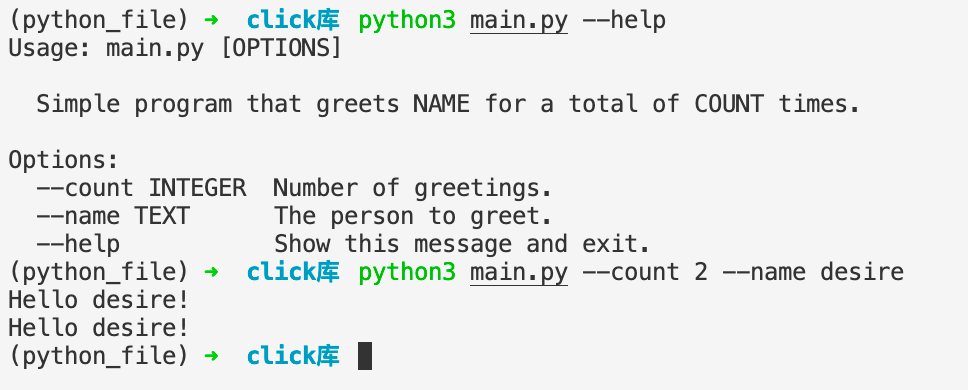之前的命令行编写方式
getopt实现方式(不讨论具体代码实现)👇🏻
1
2
3
4
5
6
7
8
9
10
11
12
13
14
15
16
17
18
19
20
21
22
23
24
25
26
27
28
29
30
31
32
33
34
35
36
37
38
39
40
41
42
43
44
45
| class ALSRun(object):
def __init__(self, in_file, out_file=None):
self.csv = in_file
self.out_file = out_file
def recommend(self):
......
if not self.out_file:
self.out_file = f'{time.strftime("%Y%m%d%H%M%S")}.csv'
nrecommendations.coalesce(1).write.csv(self.out_file)
print("🗣执行完毕🤝🤝🤝")
if __name__ == '__main__':
# 获取文件名
file_name = sys.argv[0]
usage = f'用法:{file_name} -i <inputfile> -o <outputfile>\n参数解释 \n\t-i|--ifile: 执行(必填)\n\t<inputfile>: 表示要执行的csv文件\n\t-o|--ofile:输出(非必填) \n\t<outputfile>: 表示要输出的csv文件,默认以当前时间为文件名'
try:
opts, args = getopt.getopt(sys.argv[1:], "hi:o:", ["ifile=", "ofile="])
except getopt.GetoptError:
print(f'{file_name} -i <inputfile> -o <outputfile>')
sys.exit(2)
inputfile = None
outputfile = None
if len(opts) == 0:
print(usage)
sys.exit()
for opt, arg in opts:
if opt == '-h':
print(usage)
sys.exit()
elif opt in ("-i", "--ifile"):
inputfile = arg
elif opt in ("-o", "--ofile"):
outputfile = arg
if inputfile.endswith(".csv") and (outputfile is None or outputfile.endswith(".csv")):
print("==========开始执行ALS==========")
als = ALSRun(in_file=inputfile, out_file=outputfile)
als.recommend()
else:
print("错误的传参,请看如下用法↓")
print(usage)
|
不足之处
- 太繁琐,不简洁(仅仅就是为了实现一个
python3 100als.py -i article.csv -o t.csv命令就要多写20+行) - 不易懂(啥玩意儿,过段时间再看就费劲了)
如何解决命令行的问题呢?

使用Click处理命令行

什么是Click
Click是一个Python包,用于以可组合的方式使用尽可能少的代码创建漂亮的命令行界面,是 命令行界面创建工具、是高度可配置的,但带有开箱即用的合理默认值。
它旨在使编写命令行工具的过程变得快速而有趣,同时还防止因无法实现预期的 CLI API 而导致的任何挫败感。
Click的优点
- 命令的任意嵌套
- 自动帮助页面生成
- 支持在运行时延迟加载子命令
Click安装
简单的例子
1
2
3
4
5
6
7
8
9
10
11
12
| import click
@click.command()
@click.option('--count', default=1, help='Number of greetings.')
@click.option('--name', prompt='Your name', help='The person to greet.')
def hello(count, name):
"""Simple program that greets NAME for a total of COUNT times."""
for x in range(count):
click.echo(f"Hello {name}!")
if __name__ == '__main__':
hello()
|
 从上面的例子可以看到,就仅仅的使用了三个装饰器,就把命令行实现了(并且自带–help)👍🏻
从上面的例子可以看到,就仅仅的使用了三个装饰器,就把命令行实现了(并且自带–help)👍🏻
简单的使用说明
@click.command():用来声明被装饰的类/方法是一个命令行@click.option():给命令添加选项@click.option('--count', default=1, help='Number of greetings.')- 以上面为例
- 参数1:命令行选项名
- default参数:默认值
- help:帮助信息
- prompt:提示信息(在没有传递选项的时候,会在控制台提示输入)
- 函数接收的值具体规则如下:
- 选择名称的顺序:
- 如果名称没有前缀,则将其用作Python参数名称,而不将其视为命令行上的选项名称
1
2
3
4
| @click.command()
@click.option("-f", "--filename", "dest") # 名称为 dest
def echo(dest):
print(f"{dest=}")
|
2. 如果至少有一个名称以两个破折号为前缀,则将给定的第一个名称用作名称
1
2
3
4
| @click.command()
@click.option("--f", "--foo-bar") # 名称为f
def echo(f):
print(f"{f=}")
|
3. 否则使用以一个破折号为前缀的名字
1
2
3
4
| @click.command()
@click.option("-f", "-fb") # 名称为 f
def echo(f):
print(f"{f=}")
|
解决问题
解决步骤
- 清除掉之前使用getopt编写命令行方式的代码
- 定义一个函数
def run(infile, outfile):,用来处理命令行(也可以直接在原有类上使用,但是不建议使用,会破坏原有逻辑) - 在
__main__中调用函数 run() - 在控制台使用命令行执行程序
python3 als.py -i article.csv
代码展示
1
2
3
4
5
6
7
8
9
10
11
12
13
14
15
16
17
18
| @click.command()
@click.option("-i", "--in", "infile", prompt="输入文件", help="输入文件(以.csv为后缀)")
@click.option("-o", "--out", "outfile", default=None, help="输出文件(默认为当前时间戳,以.csv为后缀)")
def run(infile, outfile):
if infile.endswith(".csv") and (outfile is None or outfile.endswith(".csv")):
ALSRun(infile=infile, outfile=outfile)
else:
print("参数格式有误!!!")
class ALSRun(object):
def __init__(self, infile, outfile):
...
if __name__ == '__main__':
run()
|
结果展示
1
2
3
4
5
6
7
8
| $ python3 100als.py --help
Usage: als.py [OPTIONS]
Options:
-i, --in TEXT 输入文件(以.csv为后缀)
-o, --out TEXT 输出文件(默认为当前时间戳,以.csv为后缀)
--help Show this message and exit.
|
1
2
3
4
5
6
| $ python3 100als.py -i article.csv
输入文件:article.csv
输出文件:20220308175307.csv
==========开始执行ALS==========
...
|
优点说明
- 简洁、易用、易读
- 不污染原逻辑
- 功能强大、拓展性强
总结

附件
具体Click用法请参考官方文档「链接」


 从上面的例子可以看到,就仅仅的使用了三个装饰器,就把命令行实现了(并且自带–help)👍🏻
从上面的例子可以看到,就仅仅的使用了三个装饰器,就把命令行实现了(并且自带–help)👍🏻
